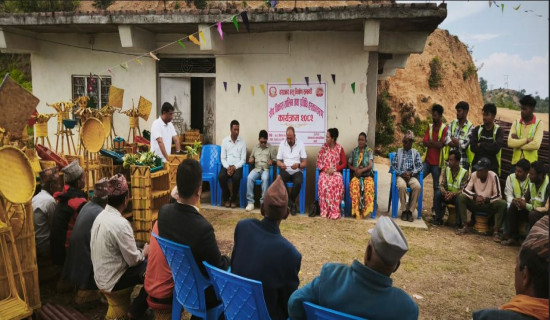- Sunday, 29 June 2025
Stop Spitting Around
Pallav Bhusal
Spitting in the streets has become an all too common sight in Nepal, and it's time we address this unsightly and unhygienic habit. Beyond its offensiveness, spitting poses serious health risks, as it can transfer various diseases and contribute to the spread of infections. It's imperative that we, as responsible citizens, collectively take a stand against this distasteful practice for the well-being of our communities.
First and foremost, spitting is undeniably disgusting. Walking down the streets of our beautiful cities should not involve navigating through pools of saliva. It's disheartening to witness the disregard for public spaces, turning them into breeding grounds for germs. The act itself is unsightly, and the resulting stains on sidewalks and walls detract from the aesthetic appeal of our neighbourhoods. We must cultivate a sense of civic pride and reclaim our public spaces from this deplorable habit.
Beyond the aesthetic concerns, the health risks associated with spitting cannot be ignored. Saliva can carry various pathogens, including bacteria and viruses, that can cause a range of diseases. In a densely populated country like Nepal, where people often share public spaces, the potential for disease transmission is heightened. Tuberculosis, for instance, is one of the infectious diseases that can be spread through respiratory droplets present in saliva. By curbing the habit of spitting, we can significantly reduce the risk of such diseases taking hold in our communities.
Furthermore, the ongoing global health challenges, including the threat of pandemics, emphasise the importance of personal and communal hygiene. Spitting in public goes against the very principles of maintaining a clean and safe environment. At a time when we are all more conscious of our health and well-being, it is essential to adopt habits that contribute positively to public health outcomes.
Addressing this issue requires a multifaceted approach. Education plays a crucial role in changing behaviour, and public awareness campaigns should be initiated to inform citizens about the health risks associated with spitting. These campaigns should highlight the impact of this habit not only on individual health but also on community well-being. Schools, community centres, and media platforms can serve as effective channels for disseminating information and promoting responsible behaviour.
Moreover, law enforcement should play a role in discouraging this practice. Stricter penalties for public spitting, coupled with visible enforcement, can act as a deterrent. While the ultimate goal is to instil a sense of responsibility and respect for public spaces, having consequences for those who persist in the habit can help create a culture of accountability.
Cultural norms also play a significant role in shaping behaviour. Efforts should be made to shift societal perceptions around spitting, emphasising that it is not just a personal choice but a collective responsibility. Engaging community leaders, influencers, and religious figures can help bring about a cultural shift and promote a cleaner, healthier environment for everyone.
It is high time we put an end to the repulsive habit of spitting in the streets. The associated health risks and the negative impact on our public spaces demand our immediate attention. Through a combination of education, law enforcement, and cultural change, we can foster a community that takes pride in maintaining clean and hygienic surroundings. Let's join hands in building a Nepal where the streets are free from the stains of spitting and where public spaces reflect the beauty of a healthy and responsible society.

















